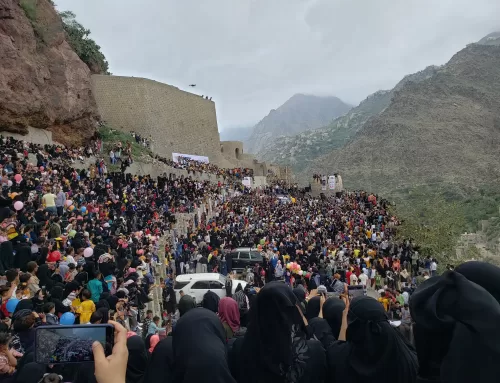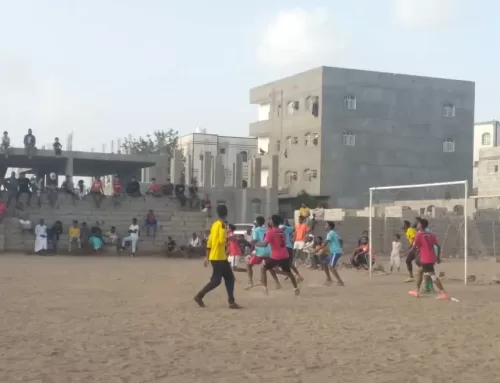27 May,2019
Dr. Ahmed (pseudonym), (50 years old), stands with dignity, in the suit he wears when he gives his university lectures, in a long queue. He adjusts his glasses, which deviated from their position when someone from the crowd pushed him, after standing for three and a half hours in three long lines with a large number of employees. The porters were prevented from entering that day, and he heard an old man complain as he pulled the heavy bags alone. Ahmed said to himself: “They deliberately humiliate us.”
The war has affected Yemeni society since Ansar Allah armed groups (Houthis) seized control of Sanaa by armed force in September 2014, and with the intervention of the coalition led by Saudi Arabia and the UAE in March 2015. Varied violations have been committed by the war parties to record Yemen as the worst humanitarian disaster in Yemen.
One of the most striking patterns that impacted the Yemeni society – and causing the worst humanitarian disaster in Yemen – was the interruption of earnings and salaries of government employees, which began in 2016 and continued until today. Every single household in Yemen is bearing the repercussions of this interruption.
Starvation Is a Weapon of War
Many employees left their government jobs and switched to the private sector in order to make a living. However, teachers and employees in the education sector were forced to continue working due to the threat of dismissal and replacement. They were hit the hardest by the suspension of salaries, since this sector is not considered as a profit-generating sector that can provide employees with small sums of money every once in a while, like in other sectors.
The central bank was moved from Sana’a to Aden, and the fates of thousands of employees in the public sector were thrust into the unknown, particularly for those living in areas under the control of Ansar Allah armed group (Houthis). The government did not treat them as citizens and did not pay them their salaries, nor did the Houthis consider themselves responsible for paying their salaries.
Since 2009, Ahmad, who holds a doctorate degree, has been working as a university professor in the training and further education sector of the Ministry of Education in Sana’a. In September 2016, his salary, similarly to the salaries of all state employees, was interrupted due to the cycle of war in which Yemen is entangled, and during which violations committed by warring parties have reached the point of using starvation as a weapon of war.
Ahmed is still lecturing in the framework of his government job and is trying to work in the private sector to cover his personal expenses, but the crisis has affected this sector as well and wages have been reduced by half because of the increasing number of university professors competing to work in private universities.
Ahmed says: “We continue working in order to keep our job and undertake our obligations. We prepare because it’s not a full-time lecturing job. Hence, we can do our jobs and at the same time work elsewhere to cover our own expenses.”
Pride and Humanitarian Assistance
Prior to the war, Ahmed considered it shameful for university professors to receive aid, which was distributed as humanitarian aid to the needy and poor during the holy month of Ramadan and religious events. Now, he is standing in line, waiting for his turn to get his share. He says: “Your respect for yourself declines in the face of your poor ability to cover your needs. All you think about is meeting and covering your needs and not saving your image. You give up appearances, status and prestige in return for providing the basics of living.”
This barrier began to disappear over time, and he started demanding the right to receive these food baskets provided by international organizations as assistance to those affected by the conflict. Receiving assistance is not humiliating or shameful but rather it’s an attempt to remedy an emergency humanitarian situation.
Travelling in order to Receive a Salary
The Hadi authority has adopted a particular procedure to pay the salaries of employees in the areas under the control of the Houthi group, which stipulates the necessity of traveling to Aden governorate with the status of “displaced person” in order to receive their salaries. This requires great efforts and is dangerous, especially with the presence of security points and the security belt that prevents citizens from the northern areas from entering Aden.
On June 19th, 2018, a group of university professors – including a university professor and her husband – were arrested at the Qahazah checkpoint of Ansar Allah (Houthis) on their way from Sana’a to Aden to get their salaries. The members present at the checkpoint asked the professors about their identities and investigated with them about the reason behind their travelling. When they found out that these people were actually university professors going to receive their salaries, they told them: “You left the students? Do you not want to teach them?” Then they informed them that travelling to Aden was forbidden. They arrested the university professors, then released them a few days later to return to Sana’a without receiving their salaries.
Houses that Are Falling Apart
Employees are left with two empty pockets in front of their children, unable to provide basic meals or to provide the value of medical service, in case of an illness. They also face the threat of losing their places of residence and families after being unable to pay the rent.
Many families could not bear the consequences of the salary cuts. Many households did not survive this stormy tide of need, destitution and disability. The economic conditions quickly forced numerous families to disintegrate and break up. People spend dozens of years trying to build their families, but in light of such a crisis, they are unable to protect or maintain them and can’t meet their requirements and their responsibilities.
Ahmed lost his wife because of his deteriorating financial state. His heart aches when he remembers her and he says: “I lost my wife because of our financial situation. We were separated as a result of these circumstances and I was unable to provide the requirements and undertake my obligations. She didn’t ask for much but I couldn’t even provide that. Family visits also became very limited due to salary interruptions and the sharp increase in transportation costs.”
The lives of many employees have been destroyed, and it is impossible for them to return to their old lives even if they are paid. Those families that have been broken up and disbanded will not be healed or reunified by disbursed salaries, but we really hope to protect the rest of the families that countless of people worked hard to build and preserve.
With the crisis of the interruption of salaries and earnings that affected most of the government sector employees in Yemen, especially those working in the education sector, Ahmed says that after he has lost everything, he no longer hides shyly in humanitarian lines, while others starve and die silently behind closed doors. All of them were university professors and worked hard to get a decent life and a safe job, and once they secured them, they thought that nobody could take them away from them, until the war erupted and took everything away.






